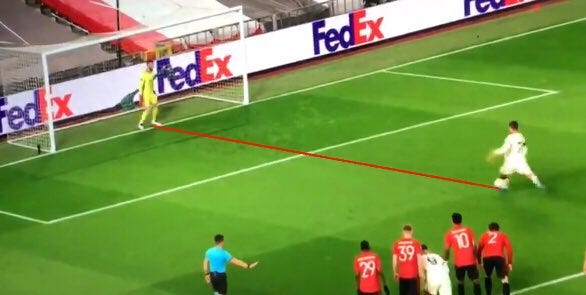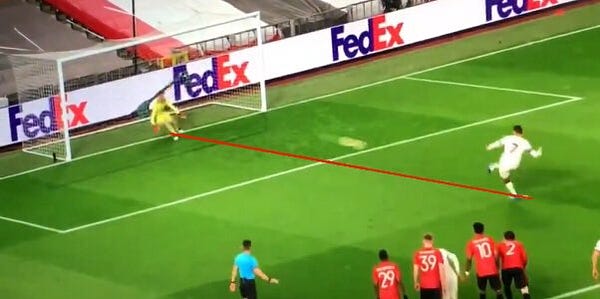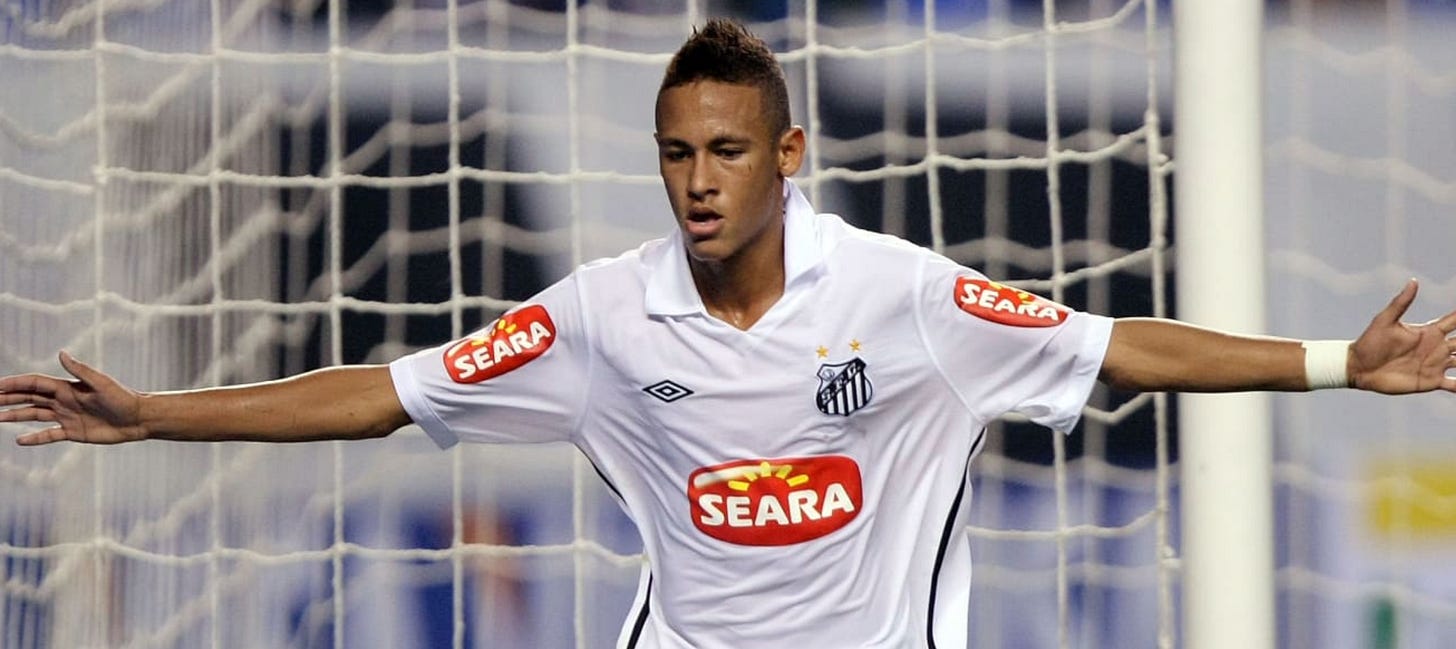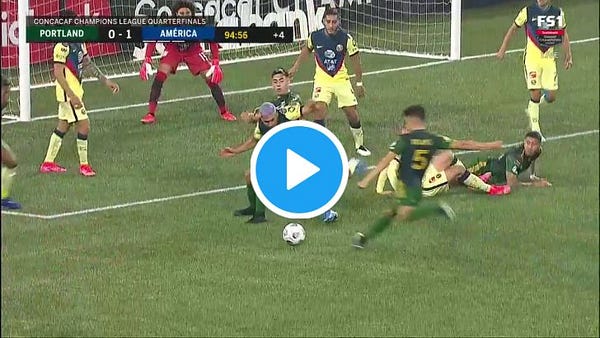What Neymar did next
FIFA banned his penalty technique but the Brazilian star found another way
Neymar was already the next big player set to come out of Brazil when his name went global in February 2010. That was when the teenager, then playing at Santos, pulled a penalty trick that scandalised Brazil and forced FIFA to change the rules.
Photo: Christophe Simon, AFP/Getty Images
Now the Brazilian is a talisman at Paris Saint-Germain and this week has the job of trying to help them reach the Champions League final. And even though his strike partner Kylian Mbappé is 9/9 from the spot for PSG this season, if the French champions get a penalty against Manchester City, Neymar will be the one taking it. The story of Neymar and penalties is an important one.
Photo: Getty Images
It begins when Neymar is at Santos, and his love of the paradinha, meaning literally, ‘little stop’, in his run-up causes an outcry that changes the penalty-kick rules.
In February 2010, Santos beats Sao Paulo 2-1 with their first goal coming from the spot. Neymar runs up to the ball, places his standing-foot next to it, cocks his kicking-foot back as though ready to strike and waits one, two seconds; Sao Paulo goalkeeper Rogerio Ceni dives to his right, and Neymar rolls the ball to his left. Ceni is furious. He says:
“I told Neymar to do it as often as possible in Brazil as when he moved to Europe, there is no way they would let him do it there.”
The chief problem with Neymar’s kick, it is generally agreed, is that it is more of a paradona (a big stop) than a paradinha (a little stop). His pause is a long one, far longer than that of Pelé, the man credited with inventing the paradinha. [Pelé and penalties is another story: he scored his goal number 1000 from the spot.]
Pelé joins the coaches, players and referees wading into the Neymar-Ceni debate. “Players stop for too long now, it wasn't like that when I was playing,” he says at the time. Internacional’s Uruguayan coach Jorge Fossati calls it “illegal and bordering on cowardly” while ex-referee Arnaldo Cezar Coelho claims every paradinha should be retaken because the goalkeeper is forced to move too early.
In May 2010, in direct response to the Neymar-Ceni fall-out, FIFA makes a change to the penalty regulations, ruling that players could change pace, but crucially, not stop, on their way to strike the ball. “Don’t FIFA have other things to worry about?” asks Neymar, who misses four of his next eight penalties.
Fast forward a decade and, despite missing three in a row for Barcelona back in 2015-16 (against Las Palmas, Roma and Real Betis), Neymar is back in his penalty groove. He no longer stops mid run-up, but he does slow down, and looks at the goalkeeper’s movement. His method is almost the perfect example of the GK-Dependent technique.
There has been some penalty controversy along the way: in Neymar’s first season at Paris, the club denied a claim that Edinson Cavani had been offered a €1m bonus to step aside from penalty duties in favour of Neymar. Later in the season, Neymar was booed by his own fans for scoring a last-minute penalty against Dijon; he already had a hat-trick, PSG was 7-0 up, and Cavani needed one more goal to become PSG’s all-time leading scorer. Awkward.
Photo: Johnny Fidelin, Icon Sport via Getty Images
This season Neymar is 5/5 for PSG and 2/2 for Brazil. On two of those occasions, (against Lorient in January and Peru in October) he scored two penalties in a single game. And overall for PSG in Ligue 1, Neymar is 16/17, his only failure hitting the post against Saint-Etienne in December 2019.
Image: L’Equipe
According to former PSG goalkeeper Jerome Alonzo, now a pundit on Canal Plus, only the best players can pull it off. He tells L’Equipe [with thanks to Matt for spotting this interview]:
“You need fantastic foot-eye coordination and very few players can do it. In the end, it comes down to taking a penalty without momentum. This makes things more complicated when you’re already under technical and mental pressure. Add [the fact] that VAR means shooters have to wait up to six minutes to take their kick.”
L’Equipe also asks Charleroi goalkeeper Nicolas Penneteau (saved 1 from 4 penalties this season) how he would deal with facing Neymar:
“The slowness of the run-up is difficult [for goalkeepers]. The slower the player goes, the more he can keep his head up for as long as possible. What makes the penalty a bit more saveable is the players who go fast on the ball. They have to lower their eyes faster, so we can make a decision to dive sooner. When they go slowly towards the ball, they have plenty of time to keep looking at us because they know where the ball is. That freezes us. Either we start but we go too early, or we try to wait, and he hits the penalty too hard.”
The rise in penalty awards in European competitions this season (see below) should deter City from any rash challenges around the corners of the box. If Neymar gets a chance, he is not likely to miss it.
PEN PALS:
Goalkeeping analyst John Harrison this week suggests Manchester United goalkeeper David de Gea is weaker than average at defending penalties. Harrison pinpoints a ‘negative step’ just before the penalty, which moves De Gea’s feet further from, rather than closer to, the corner where he wants to dive. De Gea let in a spot-kick from Roma’s Lorenzo Pellegrini last week; he has now conceded his last 25 (TWENTY-FIVE) penalties; his last save coming from Romelu Lukaku (then at Everton) back in April 2016.





Fantastic penalty scenes in the CONCACAF Champions League, where Portland Timbers secures a controversial 1-1 draw with Club America after two penalties are scored with the last kick of each half. Timbers forward Felipe Mora holds his nerve to convert right-footed, GK-Independent, non-natural side, in the 97th minute after a hotly-debated VAR penalty call. The penalty is here, the drama that leads to it below:
Perhaps the biggest surprise of the midweek Champions League semi-finals was that there were no penalties. The Europa League semis gave us two, awarded to Roma and Arsenal. As I wrote previously, penalty awards are up almost across the board, but ESPN’s Dale Johnson reports that in UEFA competitions, there are now more than one every other game. Is this down to referees, VAR, no crowds, or something else?


If Atletico Madrid wins La Liga, Jan Oblak will deserve much of the credit. In the last five weeks, the goalkeeper has kept out three penalties – and on two occasions, Atletico has won the game 1-0. On Saturday, Elche had a last-minute penalty to level the scores, but Fidel hit the post. The cameras caught Oblak off his line, but there was no retake as the rules state it’s only a goalkeeper offence “if the ball misses the goal or rebounds from crossbar or goalpost, the kick is only retaken if the goalkeeper’s offence clearly impacted on the kicker”. If Oblak had saved the penalty, it would have been a retake.
Lionel Messi misses another penalty (left-footed, GK-Independent, non-natural side) for Barcelona on Sunday night, but scores from the rebound. Barcelona has scored 10/17 from penalties this season (59 per cent conversion) and Messi has now missed 14 spot-kicks in La Liga (only Hugo Sanchez, 15, has missed more) but Barcelona still beat Valencia thanks to a Messi free-kick. This backs up one of the theories put forward in this piece on Messi’s penalty paradox: that somehow penalties matter a little less to him because he knows he can win games in other ways. And well done Darren, for spotting that Messi did exactly the same thing in the reverse fixture against Valencia: missed a penalty but scored on the rebound!
Please share any penalty thoughts or further questions to me either by commenting below or at @benlyt.
If you enjoyed this post, please spread the word about Twelve Yards and share this with your network. Recent pieces include: explaining Real Madrid’s penalty drought, how Diego Alves became the penalty scourge of La Liga, Pep Guardiola’s surprisingly impressive record in penalty shoot-outs, which players will be next to score penalties with both feet, the Chilean defender who hates penalties but keeps scoring, the Argentine penalty tradition sweeping across empty stadia in Europe, why Lionel Messi is average at penalties, how Robert Lewandowski became a penalty killer, who really invented the two-touch penalty (and Robert Pires relives his trauma), why it’s better to aim high than low, the great Ederson penalty debate, an interview with Antonin Panenka, how to define a true Panenka, how to end Antoine Griezmann’s run of five missed penalties in a row, penalty records in empty stadia, and Barcelona’s first shoot-out win in 23 years. Thank you!
Ben Lyttleton is the author of Twelve Yards: The Art and Psychology of the Perfect Penalty









